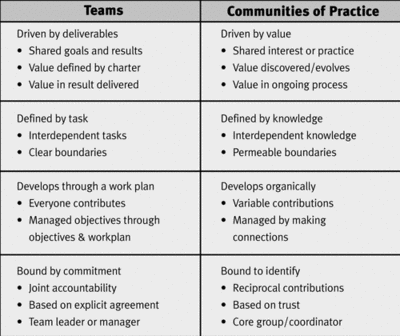 |
|
|
COPs/Teams Monday, August 08, 2005 Why Teams and COPs are different kinds of groups.Teams weave the organization together in one direction, while communities weave it together in the other (see grid below). A community of practice is a group that shares knowledge, learns together and creates common practices. COPs share information, insight, experience and tools about an area of common interest. This could be a professional discipline (such as reservoir engineering or biology), a skill (like machine repair), a topic (such as technology), an industry or a segment of a production process. Consulting companies usually organize COPs around both disciplines, such as organizational change, and industries like banking, petroleum or insurance. Community members frequently help each other to solve problems and develop new approaches or tools for their field. This makes it easier for community members to show their weak spots and learn together in the "public space" of the community.As they share ideas and experiences, people develop a set of common practices. Sometimes they formalize these in guidelines and standards, but often they simply remain "what everybody knows" about good practice. Since COPs focus on topics that people often feel passionately interested in, they can become important sources of individual identity. Teams and COPs are different kinds of groups. Teams are tightly integrated units driven by deliverables, defined by managed tasks and bound together by members' collective commitment to results. COPs are loosely knit groups driven by the value they provide to members – defined by the opportunities to learn and share what they discover and bound by the sense of collective identity that the members form. Unlike teams, COPs rarely have a specific result to deliver to the organization. Instead, they are typically driven by the value they provide to individual members. Individuals share information and insights and discover ideas which will save them money, time, energy and effort. The value that individuals derive from the community is typically what keeps community members involved. While a team delivers value in the result it produces, a community discovers value in many day-to-day exchanges of knowledge and information. The heart of a team is a set of interdependent tasks that lead to an objective. The heart of a community of practice, on the other hand, is the knowledge members share and develop. Since community members apply their knowledge on teams outside the community, it is not possible to predict exactly what knowledge will be important to the community. COPs therefore follow opportunities for sharing knowledge as they arise, and as a result the "hot topics" in a community shift over time. As topics shift new people join the community, adding their perspective and shaping its direction. While teams often have clear boundaries and membership, COPs have many partial, part-time, and marginal members. Like a double-knit fabric, they can stretch as topics and needs evolve. This article was taken from Knowledge Management Review.
Comments:
Post a Comment
~~~~~ .. ~~~~~ |
.:Find Me:. If you interested in content, please contact the Writer .:acquaintances:.
The Enterprise .:Publications:.
Telegram Buat Dian .:Others:.
The Stories Blog .:New Books:. .:talk about it:.
.:archives:.
.:credits:.
|
